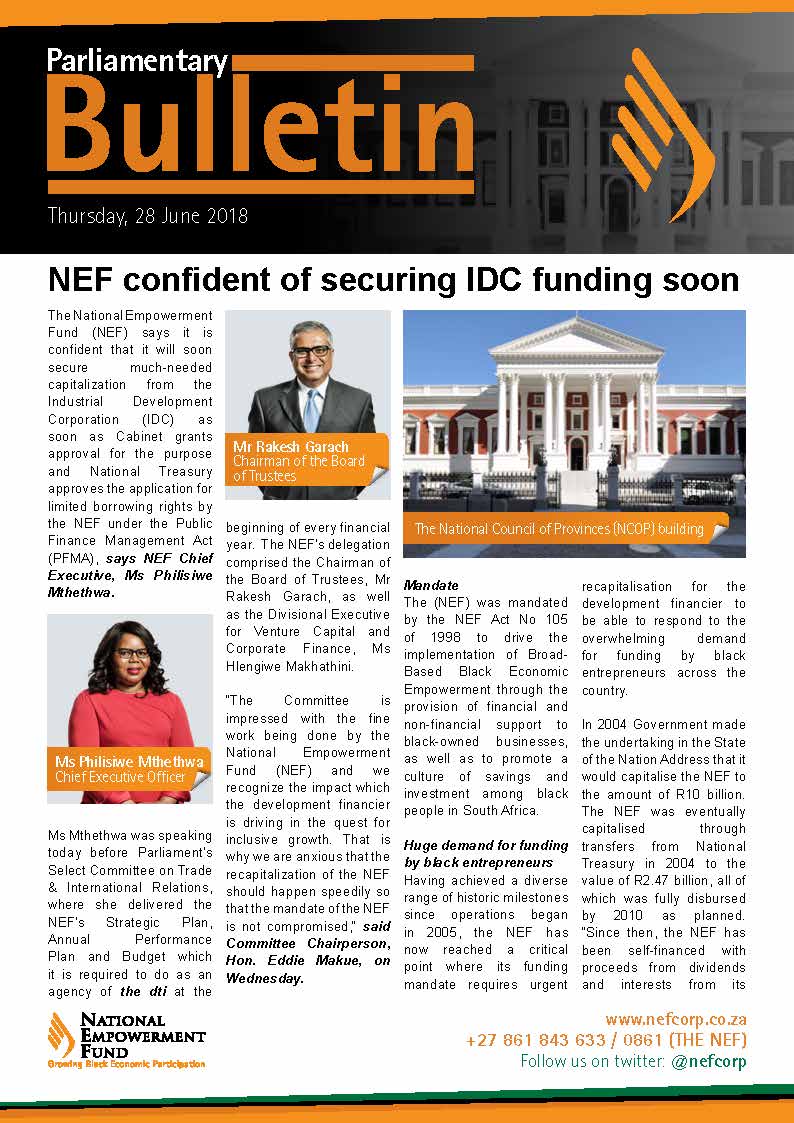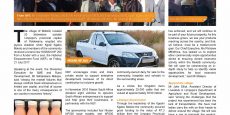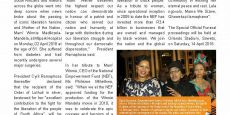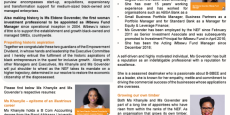
NEF Confident of Securing IDC Funding Soon
The National Empowerment Fund (NEF) says it is confident that it will soon secure much-needed capitalization from the Industrial Development Corporation (IDC) as soon as Cabinet grants approval for the purpose and National Treasury approves the application for limited borrowing rights by the NEF under the Public Finance Management Act (PFMA), says NEF Chief Executive, Ms Philisiwe Mthethwa.
Ms Mthethwa was speaking today before Parliament’s Select Committee on Trade & International Relations, where she delivered the NEF’s Strategic Plan, Annual Performance Plan and Budget which it is required to do as an agency of the dtic at the beginning of every financial year. The NEF’s delegation comprised the Chairman of the Board of Trustees, Mr Rakesh Garach, as well as the Divisional Executive for Venture Capital and Corporate Finance, Ms Hlengiwe Makhathini.
“The Committee is impressed with the fine work being done by the National Empowerment Fund (NEF) and we recognize the impact which the development financier is driving in the quest for inclusive growth. That is why we are anxious that the recapitalization of the NEF should happen speedily so that the mandate of the NEF is not compromised,“ said Committee Chairperson, Hon. Eddie Makue, on Wednesday.
Mandate
The (NEF) was mandated by the NEF Act No 105 of 1998 to drive the implementation of Broad- Based Black Economic Empowerment through the provision of financial and non-financial support to black-owned businesses, as well as to promote a culture of savings and investment among black people in South Africa.
Huge demand for funding by black entrepreneurs
Having achieved a diverse range of historic milestones since operations began in 2005, the NEF has now reached a critical point where its funding mandate requires urgent recapitalisation for the development financier to be able to respond to the overwhelming demand for funding by black entrepreneurs across the country.
In 2004 Government made the undertaking in the State of the Nation Address that it would capitalise the NEF to the amount of R10 billion. The NEF was eventually capitalised through transfers from National Treasury in 2004 to the value of R2.47 billion, all of which was fully disbursed by 2010 as planned. “Since then, the NEF has been self-financed with proceeds from dividends and interests from its investments and R1 billion proceeds from the sale in 2007 through the Asonge Share Scheme of a portion of the NEF’s holding in the MTN Group. Collections amounting to R2.8 billion have been generated from loan repayments, which continues in the normal course,” adds Ms Mthethwa.
“Having been capitalized by R2.47 billion the NEF has been able to more than double the capital base to about R5 billion through prudence and good governance. The NEF has been able to collect from the loans and re-invested this to allow a total of R6.3 billion to be injected into the economy. This shows that if the NEF had received the full capital allocation of R10 billion as announced, more could have been achieved in the transformation of the country”.
The NEF says in the current financial year over 1400 black businesses approached the development financier to seek funding of over R10.6 billion in order to fund start up, expansion and acquisition of businesses. This is double the volume of transactions the NEF had to assess in the year prior. Although over 50% of the value was declined at screening, transactions worth about R5bn went further in the approval processes, and in most instances the NEF had to refer these entrepreneurs to other potential funders due to limited capital available for investment. This shows that black entrepreneurs are eager to play an active role in the economy and with adequate resources the NEF can make a huge difference”.
Cash at hand
“The NEF’s actual cash as at 31 March stands at R1.1 billion,” says Ms Mthethwa, “with uncommitted cash at hand amounting to R94 million. Upon approval of a transaction the NEF does not disburse the entire amount, and will do so in tranches only upon the fulfilment of agreed milestones. This then explains how part of the NEF’s cash at hand has already been committed, and will continue to be disbursed into the economy as entrepreneurs gradually take their businesses to the next level. The funds that are awaiting disbursement manifest across various sectors of the economy, with manufacturing comprising the lion’s share”.
NEF milestones
She says since operational inception in 2005 to date the NEF has approved 927 transactions worth more than R9.3 billion across the country, having supported 95 798 jobs, of which 65 359 were new. As a wellrun development financier the NEF has secured clean external audit opinions for 12 years running. The recapitalisation of the NEF will also help propel the full commercialisation of all the 26 strategic and industrial projects that the NEF has developed in partnership with local and international partners. These are valued at R29 billion, with the potential to support a further 85 000 jobs.
Funding NEF through the
IDC Since July 2014 the NEF has been in discussion with the IDC in a process supported by both the dti and the Department of Economic Development. The objective was to find a sustainable and long-term recapitalisation solution for the NEF. On 14 February last year Minister Rob Davies and Minister Ebrahim Patel signed the Memorandum for incorporating the NEF as an IDC subsidiary. Subsequently, the Board of the IDC approved a facility of R500 million for the NEF in March 2017.
The IDC’s conditions precedent before the facility may be disbursed to the NEF include Cabinet approval, which the NEF is confident will soon materialise. Secondly, disbursement will require a Section 66 approval by National Treasury in terms of the PFMA for the NEF to be accorded limited borrowing rights, which is presently precluded by the classification of the NEF under the Act.






